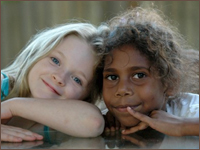 In 1994, Uniting Church minister, the late Rev. Dr Max Champion formed an organisation called The Galatians Group. Max adopted the name from the biblical text, ‘You are all one in Christ Jesus’ (Galatians 3:28).
In 1994, Uniting Church minister, the late Rev. Dr Max Champion formed an organisation called The Galatians Group. Max adopted the name from the biblical text, ‘You are all one in Christ Jesus’ (Galatians 3:28).
According to Max, the ‘unity in Christ’ referred to did not imply an exclusive religious attachment but rather the humane ordering of human affairs through the exercise of personal freedom which is tolerant of other beliefs, does not demand acquiescence to its own claims, and recognises the mutual responsibility of all.
This was very much in keeping with the Jewish faith tradition when God said to Abraham ‘… all the nations of the earth will be blessed through you and your descendants’ (Genesis 22:18).
The impetus for the formation of The Galatians Group was a Covenanting Statement published by the Uniting Church of Australia in July of that year. While supporting the goodwill towards Indigenous people and the commitment to reconciliation expressed in the Statement, Max and a number of like-minded colleagues were disturbed by its tone and substance.
Of particular concern, said Max, were its ‘ … failure to express the covenant within the framework of Christian unity; the dangerous separation of Australians into ‘Indigenous’ and ‘non-Indigenous’ races; a tendency to treat Indigenous Australians as a homogenous group; reference to the British settlement of Australia as an unmitigated disaster for Indigenous people; a flawed analysis of history – especially the failure to recognise the many benefits to native people that the new world brought; the unwarranted denigration of the work of Australia’s missionaries; and last but not least, a dangerous appeal to guilt which did not distinguish between empathy, blame and responsibility.’
Fast-forward 30 years and many of these sentiments have become even more entrenched.
How did this happen?
In the 1967 Referendum, Australians voted overwhelmingly (over 90 per cent) to eliminate racism from the Australian Constitution. Various state governments had enacted objectionable laws based on race and the new powers given to the Federal government at the referendum allowed them to override these state laws. The referendum also tidied up some anomalies in the census and the counting of the Indigenous population vis-à-vis the allocation of parliamentary seats. It is important to once again note that, prior to 1967, by virtue of the 1949 Citizens Act, all Indigenous people could vote and were full citizens, and were also counted in the census but not all were not included in the allocation of parliamentary seats. This was for purely practical reasons as some indigenous Australians lived in remote regions. The 1967 referendum tidied all this up.
The principle of ‘equality under the law’ – including the political equality of all citizens – ‘one person, one vote’ irrespective of ethnic background, was firmly entrenched in what was the most successful referendum in Australia’s history.
Which brings us to ‘The Voice’ – no, not the TV talent show or the ’80s hit song by John Farnham – but a proposal to insert into Australia’s Constitution an Indigenous body called ‘The Voice’. The Voice will have the power to influence legislation and, according to its proponents (including Prime Minister Anthony Albanese), draw up a Treaty between Indigenous and non-Indigenous Australians – i.e., “implementing the Uluru Statement in full”. The Uluru Statement says, in part, ‘Aboriginal sovereignty (over Australia) was never ceded or extinguished’.
The Voice needs to be ‘feared and revered’ said one of Uluru’s delegates.
Not exactly what Max Champion had in mind, I suspect.
Mr Albanese also said recently that he wanted Australia to follow New Zealand’s lead on Indigenous recognition. This is somewhat disturbing given the power of veto some Maori groups have over legislation in New Zealand.
Dividing Australians based on their race cannot be the way forward. White privilege may have been an issue in the past, but introducing black privilege does not balance that out.
Nor does it help, before every event, making the statement, “We acknowledge the Traditional Custodians of the land on which we gather and acknowledge that they never ceded sovereignty.” Or having politicians like Lidia Thorpe out there pushing for black sovereignty, a treaty, and non-indigenous people paying rent to indigenous people for occupying land that ‘always was, always will be Aboriginal land.’ What next? A two-state solution?
‘Closing the gap’ (between indigenous and non-indigenous people) and improving the lives of Aboriginal people is a cause all Australians support.
The Voice, however, is starting to look like something very different.